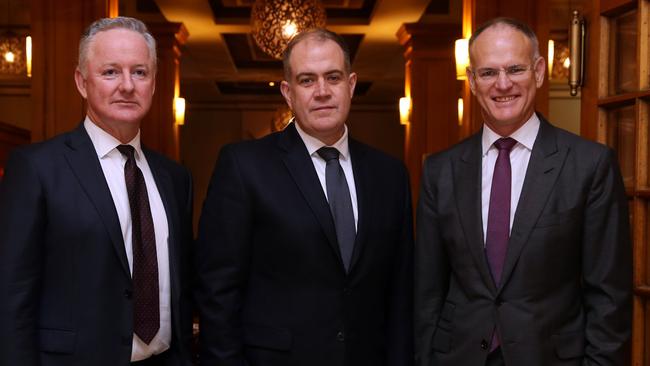Media chiefs lash ‘state of secrecy’, demand protections
Media chiefs warn Australians are at risk of losing democratic freedoms.

News Corp Australasia executive chairman Michael Miller has called for a raft of changes to legislation to protect journalists, warning Australians are at risk of losing their democratic freedoms.
Mr Miller told a public hearing on press freedom in Sydney this morning that submissions to a federal parliamentary joint committee on intelligence and security by government departments, law enforcement and national agencies “talk about the importance of a robust and free media.”
“A fundamental pillar they say. Keeping the public informed they say. The rhetoric plays the right tune,” he said.
“However, there are many laws that criminalise journalism. They are creating a secret society that most Australians would not recognise as ours.
“We may not be living in a police state, but we are living in an ever-increasing state of secrecy.
“Australians are at risk of losing their democratic freedoms,” Mr Miller said.
ABC managing director David Anderson called for stronger protections for whistleblowers, while Nine chief executive Hugh Marks described recent police raids as “a real wake up call”.
Mr Anderson told the public hearing that there was an “urgent need to restore the balance between secrecy and accountability in the nation’s affairs”.
Mr Anderson said Australia’s Right to Know coalition’s submission to the parliamentary inquiry into press freedom outlined a raft of legislative reforms that would enhance the right of the media to operate as “a bulwark of Australian democracy — informing the community on matters that affect them.”
The coalition, which includes News Corp Australia, Nine Entertainment Co and the ABC, has called for media organisations to be allowed to be heard in court when warrants aimed at journalists were being sought, and for new whistleblower protections and public interest defences.
In its submission, the coalition also called for “a properly functioning freedom of information regime” and defamation law reform.
Mr Anderson said the systems must also provide stronger protections for whistleblowers.
“Australia lags far behind its overseas counterparts in facilitating the right of members of the public to bring to light maladministration and corruption,” he said.
Mr Marks said “at face value it might be easy for some to dismiss it as media self-interest or media whining.”
“But it’s not. This is a real wake up call for us. It should be for you,” he told the parliamentary joint committee intelligence and security, which is being chaired by Liberal MP Andrew Hastie.
Mr Marks said Australia’s laws were “gagging the media”, and would lead to an “erosion of the strength of our democracy.”
“And more importantly the public won’t know because we can’t tell them, and that is the real tragedy for our society.”
The parliamentary joint committee on intelligence and security is conducting an inquiry into the powers of police and intelligence agencies and their impact on a free press following police raids in June.
The inquiry follows calls from the media industry for the federal government to overhaul legislation affecting the work of journalists after the raids on the home of a News Corp Australia journalist and the ABC’s Sydney headquarters in June.
Mr Miller said the package of law changes it was seeking “would begin to put a stop to the creeping secrecy that shrouds Canberra.”
“Some want to paint this Inquiry as only being about national security and intelligence. That is not the case.
“This is about the public’s right to know about important matters that Government doesn’t want Australians to know about.
Secret and confidential documents were not intended to be used by politicians and government officials as cover for matters that were personally or politically embarrassing, Mr Miller said.
News Corp is the publisher of The Australian.



To join the conversation, please log in. Don't have an account? Register
Join the conversation, you are commenting as Logout